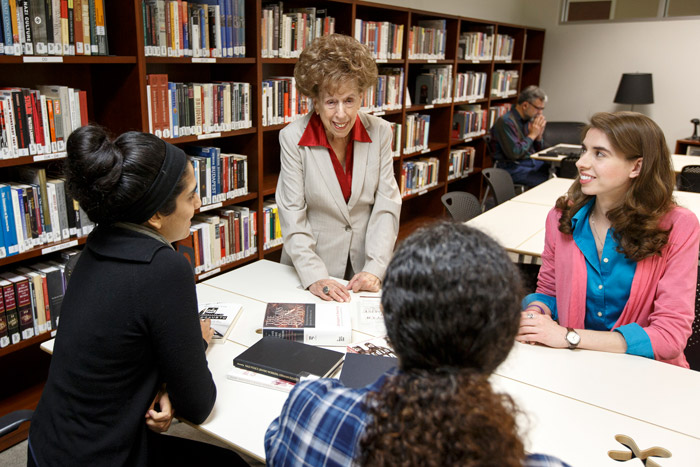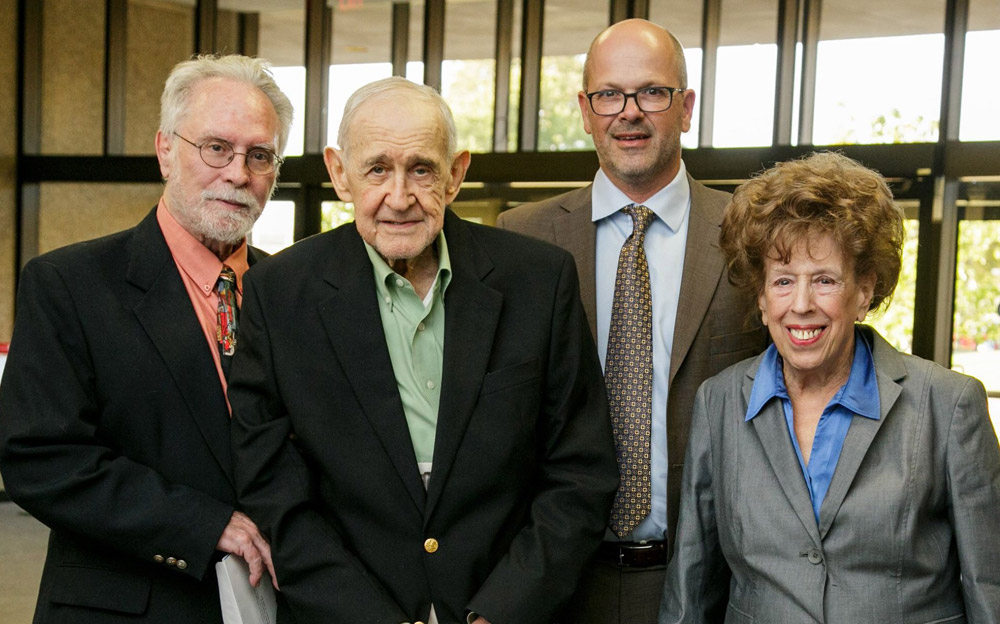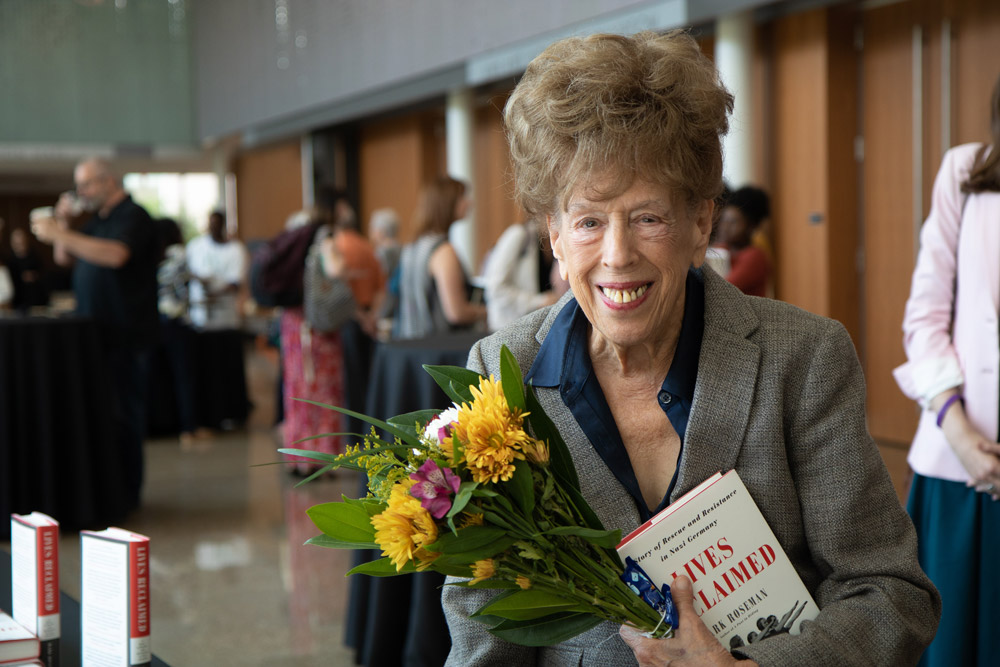Dr. Zsuzsanna Ozsváth, a Hungarian-Jewish Holocaust survivor who founded the Holocaust Studies Program at The University of Texas at Dallas, is retiring after 37 years of teaching, research and writing.
Ozsváth will officially retire Sept. 1, leaving behind a legacy of impacted lives and the creation of a program that has grown beyond her dreams.
“Zsuzsi has brought so much to the UT Dallas campus,” said Dr. Inga Musselman, UT Dallas provost, vice president for academic affairs and the Cecil H. Green Distinguished Chair of Academic Leadership. “Students, faculty, staff and community members have been enthralled by her stories and her extensive knowledge of not only the Holocaust, but also of European literature.”

Ozsváth, professor of literature and history and the Leah and Paul Lewis Chair of Holocaust Studies, joined the UT Dallas faculty in 1983, initially teaching 19th- and 20th-century literature and history classes. Shortly thereafter, she began teaching a course about the Holocaust.
“I started to study the entirety of the Holocaust. I was aware of every detail and began to publish and teach on the topic,” she said. “After I started teaching, there were more and more students wanting to take the courses, so we added more and more classes.”
The Holocaust Studies Program officially launched in 1986 and quickly earned an international reputation for excellence. In 2006, Edward M. Ackerman and his wife, Wilhelmina, made the lead gift to name the Ackerman Center for Holocaust Studies. Distinguishing elements of the program in the School of Arts and Humanities (A&H) include the Arnold A. Jaffe Holocaust Library Collection and the annual Burton C. Einspruch Holocaust Lecture Series. UT Dallas is one of just two schools in the U.S. that offers graduate-level courses in Holocaust studies. Most recently, the Ackerman Center has been honored as the new home of the prestigious Annual Scholars’ Conference on the Holocaust and the Churches.
“I love the interaction with the students, and I love to teach every single day. My teaching has brought me tremendous satisfaction and happiness. I will very much miss teaching.”
Dr. Zsuzsanna Ozsváth, professor of literature and history and the Leah and Paul Lewis Chair of Holocaust Studies
Working with Ozsváth, Dr. Hobson Wildenthal, former provost and executive vice president of UT Dallas who currently serves as distinguished scholar in residence and professor of physics, championed the Holocaust Studies Program.
“Getting engaged with Zsuzsi, getting to know her, and meeting and learning from her distinguished guests provided me with many of the most rewarding experiences at UT Dallas,” Wildenthal said. “The education and insights I received from her and the great intellectuals who visited UT Dallas for the Einspruch Lecture Series have been of immense personal meaning to me.”
Ozsváth was 9 years old in 1944 when the Nazis invaded Hungary where she lived. By May of that year, the Jewish population of Hungary had been forced into ghettos but had not been moved to concentration camps.
“I was very lucky,” she said. “We lived in Budapest, which was the only city from which the Jews were not deported to Auschwitz. Everywhere in the countryside, virtually all the Jewish children were killed.”
While known for her Holocaust classes, Ozsváth has published a number of articles dealing with aesthetic and ethical issues in French, German and Hungarian literature as well as with the relationship between art and totalitarian ideology. Since the 1980s, she has undertaken several translation projects and worked on various branches of Holocaust studies.
Her collaborator on the translation projects, Dr. Frederick Turner, professor of literature and creative writing and Founders Professor, also is retiring at the end of August. Turner said he learned a great deal working with Ozsváth.
“Zsuzsi is immensely learned in European literature; she’s just a fount of knowledge and wisdom,” he said. “She is delightful.”
“Zsuzsi has brought so much to the UT Dallas campus. Students, faculty, staff and community members have been enthralled by her stories and her extensive knowledge of not only the Holocaust, but also of European literature.”
Dr. Inga Musselman, UT Dallas provost
Ozsváth has published several books: The Golden Goblet: Selected Poems of Goethe is a collection of translations by Ozsváth and Turner; My Journey Home: Life After the Holocaust is a follow-up to her memoir, When the Danube Ran Red, and captures life after the war’s end in Communist-ruled Hungary and continues with her and her husband’s flight to Germany and eventually the U.S. In 1963, Ozsváth’s husband, Dr. Istvan Ozsváth, joined the Graduate Research Center of the Southwest — the precursor institution to UT Dallas. At the time of his death in 2013, he was a professor emeritus of mathematical sciences.
Dr. Nils Roemer, the Stan and Barbara Rabin Professor in Holocaust Studies, director of the Ackerman Center and interim dean of A&H, said it will be very difficult to find another scholar who possesses such a broad range of knowledge.
“We have been so privileged to have this person who is a Holocaust scholar, who was trained in teaching European literature and who is a passionate translator of works from two different languages,” he said. “She leaves a big hole.”
Ozsváth, who is a classically trained pianist, spent the spring semester on a sabbatical and also stayed away from campus because of the COVID-19 pandemic.
“As soon as the [COVID-19] prison is over and we are able to gather again, I will be back at UTD to listen to the great Holocaust scholars who will speak at our conferences,” she said.
“We have been so privileged to have this person who is a Holocaust scholar, who was trained in teaching European literature and who is a passionate translator of works from two different languages. She leaves a big hole.”
Dr. Nils Roemer, director of the Ackerman Center for Holocaust Studies
Roemer said Ozsváth has been like a rock star, with people from the community and students eager to spend time with her.
“I’ve been with Zsuzsi lecturing in front of teenagers who run up at the end of the talk so they can take pictures with her. They were so happy to be with her at that moment. She
’s a special person, and everyone feels that,” he said.
It is those types of moments that Ozsváth said she will miss most after she retires.
“I love the interaction with the students, and I love to teach every single day. My teaching has brought me tremendous satisfaction and happiness,” she said. “I will very much miss teaching.”
While she will not be teaching in the future, Ozsváth said she will continue to do translation work and other writing. And she said she looks forward to seeing the continued growth of the Ackerman Center.
“The center has been a wonderful fulfillment of dreams and one that will become ever more fulfilled,” she said. “It is absolutely fantastic.”

